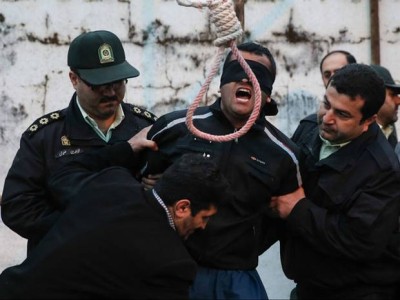PHOTO: Iranian prisoner Bilal Abdullah, just before he escaped hanging at last minute when victim’s mother interceded, April 2014
Fars News, the outlet of Iran’s Revolutionary Guards, offers a fine example this morning of editing: it highlights a report on the death penalty to condemn other countries while keeping Tehran out of the spotlight.
Fars headlines, “Amnesty Warns Against ‘Alarming Rise’ in Death Sentences”:
Egypt and Nigeria accounted for an “alarming rise” in the number of death sentences handed out around the world in 2014, Amnesty International said Wednesday.”
“It’s a very worrying development in 2014 that there has been this increase in death sentences,” Audrey Gaughran, Amnesty’s director of global issues, [said]. “The death penalty isn’t justice.”
Amnesty’s report does express specific concern about Egypt and Nigeria, where courts have imposed mass death sentences in some trials. However, it also has this passage about executions that have actually been carried out:
The Iranian government claims it executed 289 people in 2014; reliable sources inform us that the figure is at least 743. Executions were sometimes carried out in secret, with some prisoners’ family and lawyers finding out afterwards, and the Iranian government refusing to return their loved one’s body.
At least 14 people executed by Iran last year were under 18 at the time their crime was allegedly committed – Iran continues to ignore international laws that outlaw executing juvenile offenders.
The Iranian authorities executed numerous prisoners for “non-serious” crimes — such as drugs offences, “insulting the prophet”, “enmity against God”, and being a member of an armed opposition group. Many trials that resulted in death sentences did not meet international standards for fair trials.
Somehow, Fars overlooks these executions — in comparison to about 15 in Egypt in 2014 and none in Nigeria — as it quotes Amnesty’s Gaughran, “There is no evidence that the death penalty is any more of a deterrent to violent crime or terrorism than other forms of punishment.”

